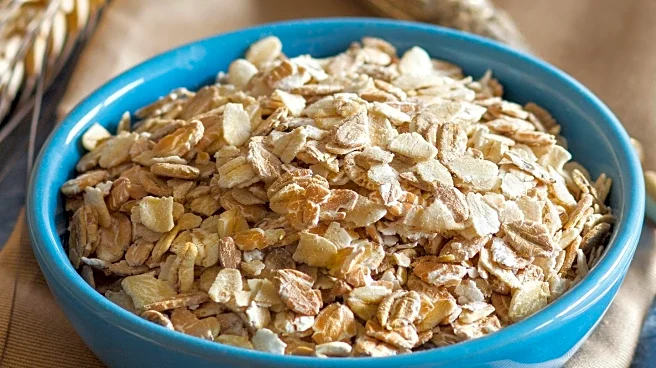What is the story about?
What's Happening?
Recent studies have underscored the significant impact of dietary fiber on mental health, emphasizing its role in regulating mood and reducing stress. Nutrition coach Cristina Barrous explains that fiber feeds microorganisms in the body, which in turn regulate the microbiota, immune system, and blood glucose. This process positively influences neurotransmitters like serotonin and dopamine, crucial for mood regulation. The gut-brain axis, a bidirectional communication system between the central and enteric nervous systems, plays a pivotal role in this interaction. Studies have shown that higher fiber intake is associated with lower levels of depression and anxiety symptoms. Additionally, fiber reduces inflammation, a factor linked to mental health conditions such as depression and anxiety. The consumption of fiber-rich foods, including flaxseed, fruits, and vegetables, is encouraged to support these benefits.
Why It's Important?
The findings on fiber's impact on mental health have broad implications for public health and dietary recommendations. By highlighting the connection between fiber intake and mental well-being, these studies suggest that increasing fiber consumption could be a simple yet effective strategy to combat mental health issues like depression and anxiety. This could lead to changes in dietary guidelines and public health policies, encouraging the inclusion of more fiber-rich foods in daily diets. The potential reduction in mental health disorders through dietary adjustments could alleviate healthcare costs and improve quality of life for many individuals. Furthermore, understanding the gut-brain axis and its influence on mood could pave the way for new treatments and interventions targeting gut health to enhance mental health outcomes.
What's Next?
As research continues to explore the relationship between diet and mental health, there may be increased advocacy for dietary changes at both individual and policy levels. Nutritionists and healthcare providers might begin to incorporate fiber intake recommendations into mental health treatment plans. Additionally, food manufacturers could respond by developing and marketing products that are high in fiber, catering to the growing demand for foods that support mental well-being. Public health campaigns may also emerge, aiming to educate the public on the benefits of fiber for mental health and encouraging lifestyle changes that include more fiber-rich foods.
Beyond the Headlines
The exploration of fiber's impact on mental health also raises ethical and cultural considerations. As dietary habits are deeply rooted in cultural practices, promoting fiber-rich diets may require sensitive approaches that respect cultural food traditions while encouraging healthier choices. Additionally, the focus on gut health and its connection to mental well-being could lead to a broader understanding of holistic health practices, integrating nutrition with mental health care. This shift could challenge existing paradigms in healthcare, emphasizing the importance of diet in overall health and well-being.

















